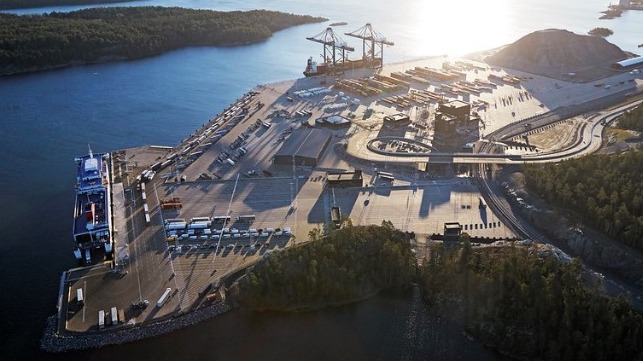Stockholm Norvik Port is Now Fully Operational

After nearly four years of construction, Stockholm’s new port is now fully operational. With easy access to the Baltic and short approach lanes, Stockholm Norvik Port was designed to become a transport hub in Sweden’s largest consumer area, the region around Stockholm. It is a modern, intermodal port that improves shipping access to and from Sweden.
“Now that all of Stockholm Norvik Port is finally completed, we can offer substantially greater capacity and opportunities for our customers to grow. We can also offer our customers improved service in the form of greater possibilities to store and transfer cargo, as well as eco-efficient alternatives to transport goods to and from Stockholm,” explains Johan Wallén, Chief Commercial Officer at Ports of Stockholm.
The new port facilities provide increased capacity for more and larger vessels. According to the port authority, it means that more goods can be transported directly to the Stockholm region, where half of Sweden’s consumption takes place.
Construction of Stockholm Norvik Port started in 2016, and the port was completed on schedule and on budget. The project, which cost approximately $460 million, involved more than 200 contractors. The port was built to enhance efficiency and with favorable environmental choices to meet the demands of the future.
“It really is fantastic that despite these difficult times we have been able to open a port on time and on budget. Stockholm Norvik Port offers state-of-the-art, sustainable logistics solutions both now and for the future,” said Thomas Andersson, CEO at Ports of Stockholm.
The new port encompasses more than 100 acres, located 30 miles south of Stockholm. The components of the port include a container terminal operated by Hutchison Ports that replaces the CTF container terminal at the old Frihamnen Port. The other portion of the port is a RoRo terminal for rolling goods that is operated by Ports of Stockholm.
Construction was completed in two phases, with the container terminal opening in May 2020. The RoRo terminal opened in November with all the yards and other facilities now fully operational. The port includes over 4,300 feet of quay with a port depth of 54 feet, making it able to handle the largest vessels that operate in the Baltic.

that matters most
Get the latest maritime news delivered to your inbox daily.
The port also features intermodal capabilities with railway connections to the national railway transport network providing access to all parts of Sweden. According to the port authority, by having imported goods arrive directly in the Stockholm region by ship, instead of arriving at more distant ports, congestion will also be eased on the roads and the railway system.
